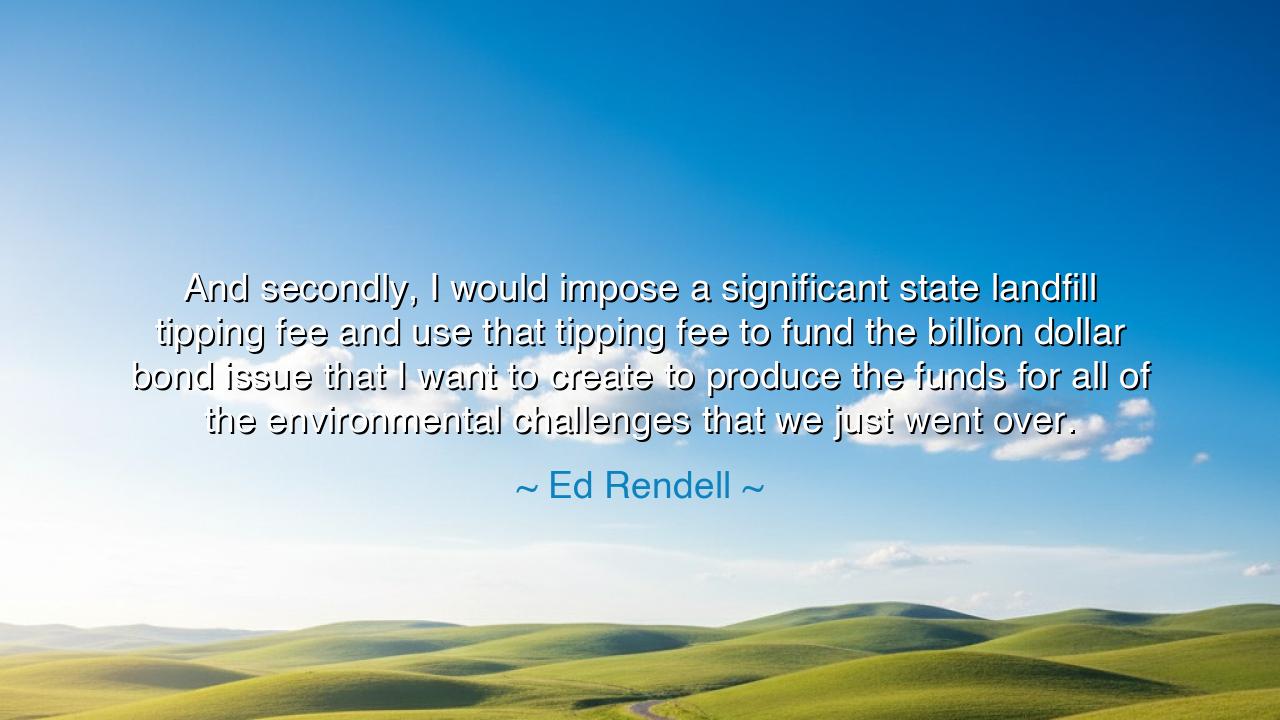
And secondly, I would impose a significant state landfill tipping
And secondly, I would impose a significant state landfill tipping fee and use that tipping fee to fund the billion dollar bond issue that I want to create to produce the funds for all of the environmental challenges that we just went over.






When Ed Rendell declared, “And secondly, I would impose a significant state landfill tipping fee and use that tipping fee to fund the billion dollar bond issue that I want to create to produce the funds for all of the environmental challenges that we just went over,” he was speaking not merely as a politician, but as a steward of the Earth’s future. Beneath the technical language of economics lies a profound moral principle — that those who consume and discard must also bear the cost of healing what they have harmed. His vision was not simply about fees and funding, but about responsibility and renewal — the ancient law of balance between the taking and the giving, between the wound and its mending.
The origin of this statement rests in Rendell’s time as the Governor of Pennsylvania, when he sought to address the mounting crisis of waste and environmental decay. His proposal to create a landfill tipping fee — a charge imposed on each ton of waste buried in the earth — was both practical and symbolic. It was a way to make those who contribute to pollution pay into a fund that could restore the natural order. By linking the act of disposal to the act of restoration, Rendell invoked a truth known to wise leaders of every age: that the wealth of civilization cannot come at the expense of the soil that sustains it.
To fund environmental challenges through such a mechanism is to turn waste into wisdom. It is to recognize that within every act of consumption lies a debt to the Earth. Rendell’s proposed billion-dollar bond issue was more than a fiscal policy — it was an act of repentance made manifest through governance. Just as ancient societies offered sacrifices to atone for their excesses, this modern policy sought to convert guilt into growth, pollution into possibility. The land, long treated as a dumping ground, would once more become a partner in prosperity.
This idea echoes through history. In the days of ancient Mesopotamia, when farmers overworked their fields and the soil grew barren, kings decreed years of rest for the land — a primitive but profound understanding that nature demands reciprocity. Later, in the laws of Moses, we find the same wisdom: every seventh year, the earth was to lie fallow, that it might recover its strength. Ed Rendell’s proposal carries this same spirit forward into the modern world. His tipping fee is a reminder that the Earth’s generosity is not endless, and that renewal requires deliberate human effort.
Yet, there is more to his words than policy — there is warning. To ignore such measures is to court ruin. Every landfill is a monument to a civilization’s appetite, and each ton of waste buried beneath our feet is a silent record of our neglect. The environmental challenges Rendell refers to are not distant threats but living consequences: polluted rivers, poisoned air, melting ice, and vanishing forests. His solution, grounded in economics, is also an appeal to conscience — that we must face the cost of our comfort and pay it forward into healing.
The lesson within this quote is clear: sustainability cannot be achieved through desire alone; it must be built into the structures of society. Responsibility must be measured, valued, and acted upon. To impose a fee on waste is to remind every citizen that the Earth is not an infinite container, but a living organism that demands care. The money gathered is not punishment but penance — an offering to the future. And those who contribute to the repair of the world do not lose; they invest in the longevity of all that sustains them.
So, let Rendell’s words be heard as more than the voice of a statesman. Let them be understood as a call to moral accounting — that every generation must reconcile what it has taken with what it gives back. The tipping fee he speaks of is not merely financial; it is spiritual, a toll paid by humanity for its passage across the fragile bridge of existence. To fund the healing of the Earth through the fruits of its exploitation is poetic justice — the kind that redeems civilization from its own carelessness.
And thus, to those who inherit his message: act with foresight. Support the measures that make waste costly, and restoration fruitful. Let every act of consumption carry within it the seed of renewal. For as Rendell’s vision teaches, a society that buries its waste without conscience will one day bury itself beneath the weight of its own neglect. But a people who turn their refuse into redemption — who use their resources to restore the Earth — will stand as stewards of creation, building not only wealth, but wisdom, for generations yet unborn.






AAdministratorAdministrator
Welcome, honored guests. Please leave a comment, we will respond soon